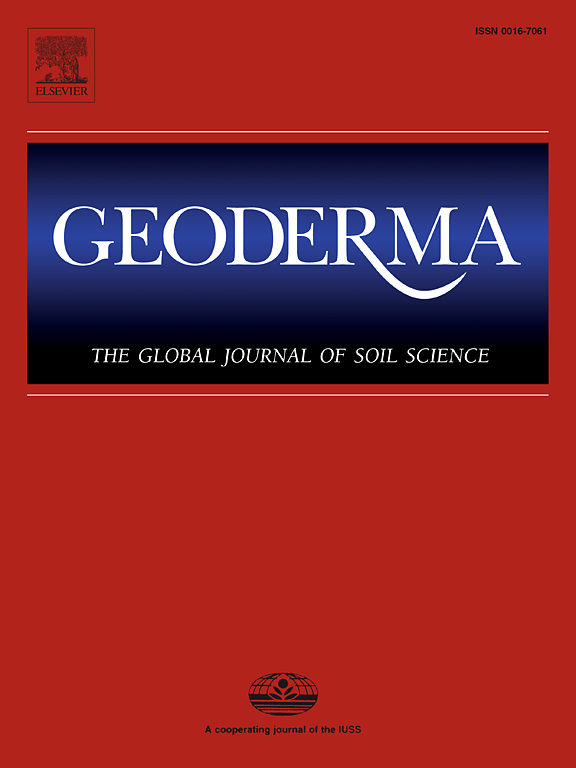界定ph相关生态集群及其对农业集约化的响应
IF 6.6
1区 农林科学
Q1 SOIL SCIENCE
引用次数: 0
摘要
土壤pH值是影响土壤微生物参与生物地球化学过程的主要因素。然而,不同的微生物类群对pH值的响应不同,其生态功能尚不清楚。这一差距限制了我们对pH值影响土壤微生物群落结构和功能的精确途径的理解。在这项研究中,我们根据它们对pH的反应确定了7个生态集群:亲酸型、条件亲酸型、亲碱型、条件亲碱型、机会主义者、保守主义者和自由主义者。嗜酸菌和条件嗜酸菌与养分循环功能呈正相关,而嗜碱菌和条件嗜碱菌呈负相关。此外,频繁扰动土壤pH的农业集约化(农田vs温室)直接或间接影响pH相关生态集群的丰度。嗜酸菌和机会菌在集约化农业土壤中富集,而自由菌主要在传统农业土壤中存在。微生物群落组成的变化显著影响土壤生态系统功能,其中嗜酸菌、自由菌和机会菌可能是养分循环功能的主要贡献者。分别是人畜共患病原体和植物有益微生物。我们的研究结果强调了土壤pH值、微生物生态集群和土壤功能之间复杂的相互作用,强调了有针对性的农业管理措施来维持土壤健康的必要性。本文章由计算机程序翻译,如有差异,请以英文原文为准。
Defining pH-associated ecological clusters and their responses to agricultural intensification
Soil pH is a major factor influencing the participation of soil microorganisms in biogeochemical processes. However, different microbial taxa exhibit varied responses to pH levels, and their ecological functions remain unclear. This gap limits our understanding of the precise pathways through which pH affects the structure and function of soil microbial communities. In this study, we identified seven ecological clusters based on their responses to pH: Acidophile, Conditioned Acidophile, Alkaliphile, Conditioned Alkaliphile, Opportunist, Conservative, and Liberalist. Acidophiles and Conditioned Acidophiles exhibited a positive correlation with nutrient cycling functions, whereas Alkaliphiles and Conditioned Alkaliphiles showed a negative correlation. Additionally, agricultural intensification (farmland vs. greenhouse) with frequent perturbation of soil pH directly or indirectly influences the abundance of pH-associated ecological clusters. Acidophiles and Opportunists were enriched in intensive agriculture soils, while Liberals were predominantly found in traditional agriculture soils. Changes in microbial community composition significantly influence soil ecosystem functions, with Acidophiles, Liberalists, and Opportunists potentially serving as the primary contributors to nutrient cycling functions, animal & zoonotic pathogens, and plant beneficial microbes, respectively. Our results highlight the complex interactions between soil pH, microbial ecological clusters, and soil functionality, emphasizing the need for targeted agricultural management practices to maintain soil health.
求助全文
通过发布文献求助,成功后即可免费获取论文全文。
去求助
来源期刊

Geoderma
农林科学-土壤科学
CiteScore
11.80
自引率
6.60%
发文量
597
审稿时长
58 days
期刊介绍:
Geoderma - the global journal of soil science - welcomes authors, readers and soil research from all parts of the world, encourages worldwide soil studies, and embraces all aspects of soil science and its associated pedagogy. The journal particularly welcomes interdisciplinary work focusing on dynamic soil processes and functions across space and time.
 求助内容:
求助内容: 应助结果提醒方式:
应助结果提醒方式:


